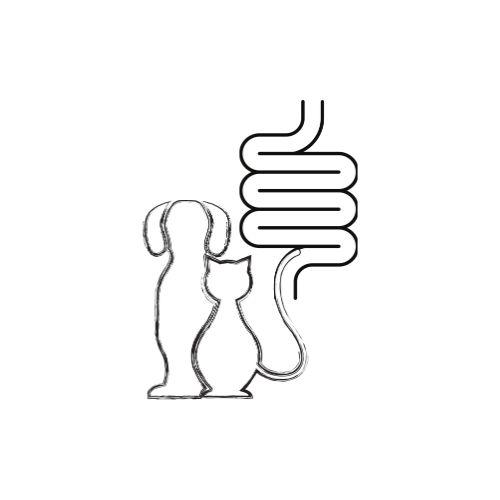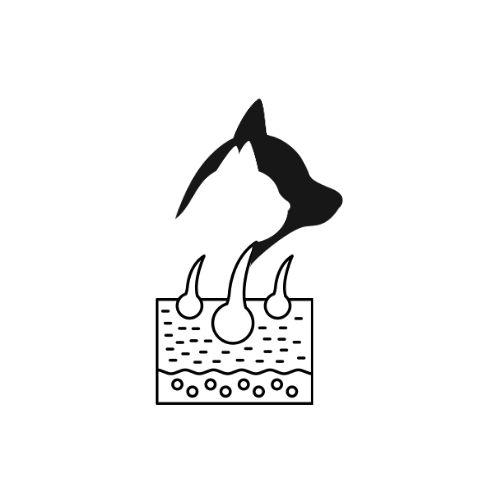In Italy, 3 million dogs and cats suffer from chronic intestinal disorders.
Enteropathies are often associated with an imbalance in the gut flora, known as microbiome dysbiosis. Dysbiosis can be addressed through fecal microbiota transplantation (FMT).
More than 80% of animals with chronic enteropathies benefit from fecal microbiota transplantation.
The Pet FMT Project was created to make fecal microbiota transplantation more accessible and increasingly effective.
FMT (Fecal Microbiome Transplant)
- the microbiome of a healthy organism is transferred to a diseased one
- the aim is to restore the balance of microbes and well-being
- it is simple, safe and with virtually no side effects
- it's natural: dogs and cats are coprophages- brings improvements to over 80% of enteropathic animals
- it is also practiced in humans and other animals
Pet FMT Project is...
- for the well-being of enteropathic dogs and cats
- for those who love and take care of animals
- search FOR dogs and cats
- approved by the OPBA of the University of Padua
- unique in Europe
- open and collaborative
The Pet FMT Project includes
Pet FTM project goals
Accessible FMT
Easily accessible FMT to enteropathic pets a cani e gatti with lyophilized capsules
Personalized FMT
FMT more effective with centralized data collection and artificial intelligence
Who can participate to the Pet FMT Project
PASSIONATE VETERINARIANS
To offer your customers an extra option and contribute their experience.
Over 80% of animals with transplantation are better off.
DOGS AND CATS WITH CHRONIC ENTEROPATHY OR ATOPIC DERMATITIS
To fight dysbiosis and restore balance and well-being.
The project can be joined only through a veterinarian, and he / she should signed the project agreement.
HEALTHY DONORS AND THEIR OWNERS
Because without your contribution we can't even start.
We are constantly looking for healthy pets and sensitive and helpful owners.
Fill in the questionnaire.
RESEARCHERS AND STUDENTS
To make the best use of the data we collect and create knowledge.
Collaborate with us! Help us to value the data and samples collected thanks to the contribution of the many participants in the Pet FMT Project.
PET LOVERS
Pet lovers can contribute in many ways!
Tell friends about the project or donate your dog or cat's microbiome analysis, or participate in fundraising campaigns.
The future with Pet FMT Project
Fewer Unresolved Cases
Enteropathies are complex diseases.
Understanding and addressing the dysbiosis that often accompanies enteropathy is a new therapeutic opportunity born from microbiome science.
The path toward personalized, precision FMT is now clear.
Fewer Antibiotics
The effectiveness of antibiotics in treating enteropathy is linked to their action against intestinal pathogens.
However, antibiotics kill both good and bad bacteria indiscriminately, with significant consequences for the animal’s well-being.
FMT has the potential to replace antibiotics in targeting harmful microbes, offering a positive impact on the growing issue of antibiotic resistance.
Happier Everyone
Chronic enteropathy negatively affects the quality of life of the animal, its owner, and even the trusted veterinarian.
Making fecal microbiota transplantation more accessible and increasingly effective can restore well-being and peace of mind for all.
Why we do this
Bruno (on the cover) is a mixed-breed rescue dog belonging to one of the EuBiome partners. At the age of 5, he developed chronic enteropathy. Thus began a long journey in search of solutions to his monthly episodes of diarrhea and vomiting.
After years of unsuccessful attempts (after all, the condition is called chronic enteropathy for a reason), Bruno underwent three cycles of fecal microbiota transplantation, and from then on, he remained well—until the age of 19, when, sadly, he passed away.
We hope that the same opportunity can be available to others who, like him, may benefit from this treatment.
We are aware that FMT is still in its early stages, that it is a field of experimentation, and that outcomes are not always predictable. But the results are real: over 80% of pet owners report observing improvements after transplantation. Still, research must continue—to understand why it works in some cases and not in others, to define how much and what kind of material should be administered, and when.
After all, partial responses, temporary results, and failures are also common with the standard protocols used in these cases: special diets, probiotics, antibiotics, corticosteroids, and immunosuppressants.
The risks of FMT have been extensively evaluated in humans, and the most frequently cited phrase in the literature is “FMT is safe.” The same conclusions appear in veterinary studies. Risks are considered minimal compared to the potential benefits—especially considering that dogs and cats are often naturally coprophagic. One more confirmation: there are over 500 registered human clinical trial on FMT.
.
The Pet FMT Project was born with the aim of aggregating people passionate of dogs, cats and microbiome, to accelerate the development of knowledge on FMT, to help to transform successful cases into clinical protocols, and to offer a therapeutic option to 30 million of dogs and cats suffering from chronic enteropathy in Europe.

Case study
LBruno's story became a scientific article published in Animals magazine in May 2021.
Berlanda M, Innocente G, Simionati B, Di Camillo B, Facchin S, Giron MC, Savarino E, Sebastiani F, Fiorio F, Patuzzi I. Faecal Microbiome Transplantation as a Solution to Chronic Enteropathies in Dogs: A Case Study of Beneficial Microbial Evolution. Animals. 2021; 11(5):1433. https://doi.org/10.3390/ani11051433
Le pubblicazioni di EuBiome
A Protocol for Fecal Microbiota Transplantation Using Freeze-Dried Capsules: Dosage and Outcomes in 171 Dogs with Chronic Enteropathy.
Brugnoli, F.; Simionati, B.; Patuzzi, I.; Lombardi, A.; Giron, M.C.; Savarino, E.; Facchin, S.; Innocente, G.
Pets 2025, 2, 16. https://doi.org/10.3390/pets2020016
Microbiome One Health model for a healthy ecosystem.
Tomasulo A, Simionati B, Facchin S.
Sci One Health. 2024 Mar 30;3:100065. doi: 10.1016/j.soh.2024.100065. PMID: 39077385; PMCID: PMC11262273.
Characterization of Gut Microbiome Composition in Patients with Triple-Negative Breast Cancer Treated with Neoadjuvant Chemotherapy
Vernaci G, Savarino EV, Patuzzi I, Facchin S, Zingone F, Massa D, Faggioni G, Giarratano T, Miglietta F, Griguolo G, Fassan M, Lo Mele M, Gasparini E, Bisagni G, Guarneri V, Dieci MV.
Oncologist. 2023
Machine Learning and Canine Chronic Enteropathies: A New Approach to Investigate FMT Effects.
Innocente G, Patuzzi I, Furlanello T, Di Camillo B, Bargelloni L, Giron MC, Facchin S, Savarino E, Azzolin M, Simionati B.
Vet Sci . 2022
Nota: gli articoli citati sono quelli pubblicati da EuBiome o a cui ha contribuito personale di EuBiome; a questi si possono aggiungere le centinaia di altre pubblicazioni, prodotte al di fuori del contesto di EuBiome, ma rilevanti in termini di competenze complessive, dallo staff e dai soci.
Join us!
Together we can help many to live better
Become a donor!
Without donors, we cannot help sick pets.
Subscribe to the newsletter!
You will find out how the microbiome can change life, the news about the Pet FMT Project and how to contribute if you want.


